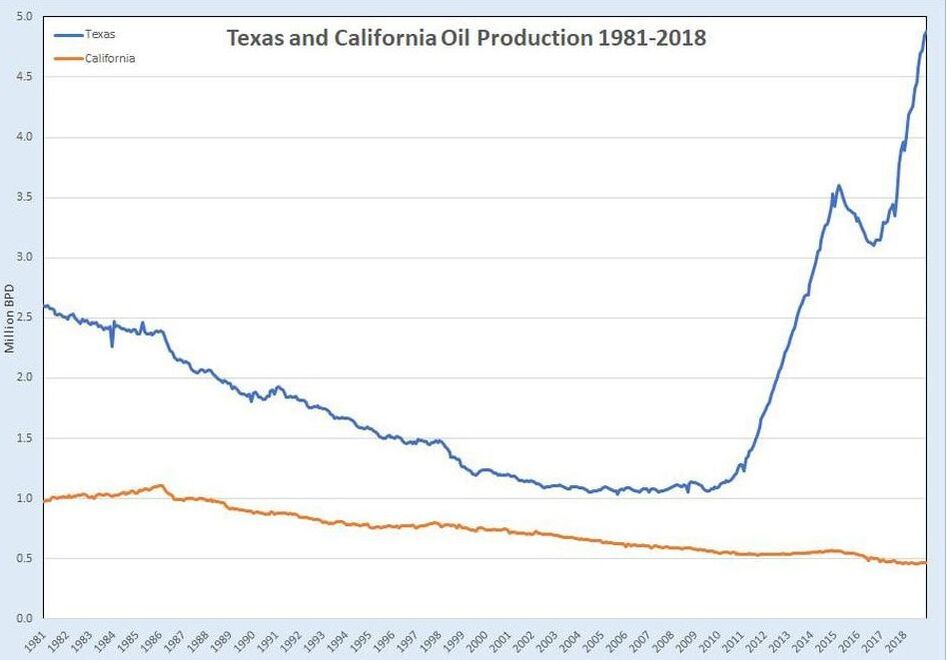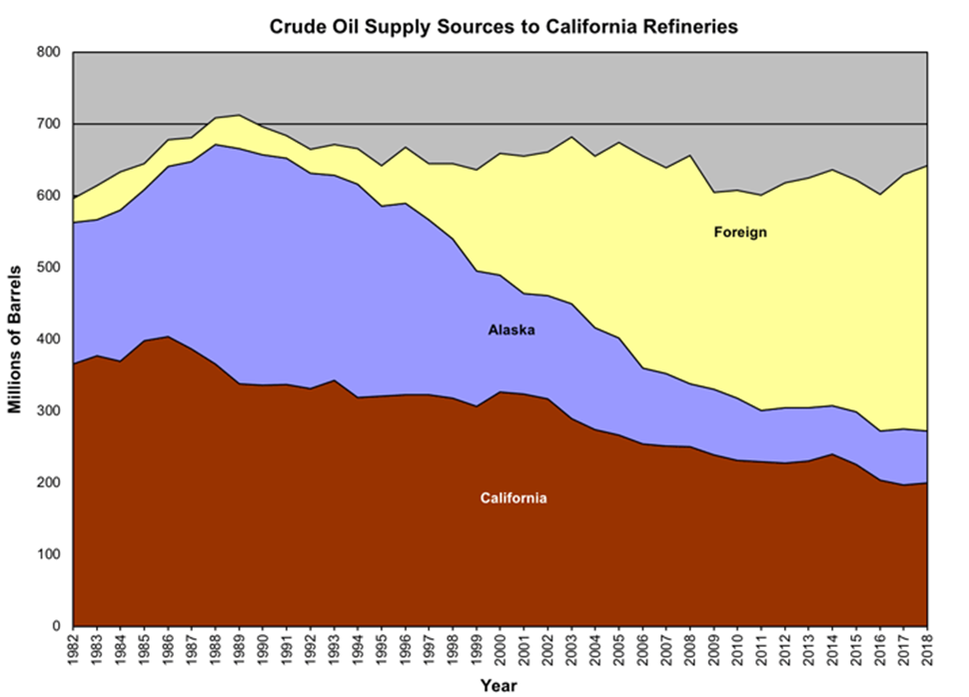Tensions are running high after Iran shot down an unarmed U.S. drone in the Strait of Hormuz between the Persian Gulf and the Gulf of Oman. The Strait of Hormuz is critically important to the world as one of the most important choke points for oil transport. A country controlling the Strait of Hormuz could stop much of the flow of oil out of the Middle East, causing shock waves to the global economy.
Why, given the surge of oil production in the U.S., are we so concerned about the flow of oil through the Strait of Hormuz? It may surprise many that California is a big reason.
California's War on Oil
California is well-known for its progressive policies. The state has waged an aggressive campaign to move away from fossil fuels. One of the consequences of this campaign has been a steady decline in California's oil production.
Many people are unaware about California's importance in the U.S. oil industry. In fact, 100 years ago California was the top oil producer in the U.S., responsible at one point for nearly 40% of U.S. oil production. California's oil production rose throughout most of the 20th century, briefly eclipsing one million barrels per day in the early 1980s. But California's oil production has been in decline for many years, with the state totally missing out on the shale oil boom that has boosted oil production across the U.S. There are some geological reasons for this, but there is also staunch opposition to drilling for oil in California. The net result is that California's oil production continues its long decline.
Why, given the surge of oil production in the U.S., are we so concerned about the flow of oil through the Strait of Hormuz? It may surprise many that California is a big reason.
California's War on Oil
California is well-known for its progressive policies. The state has waged an aggressive campaign to move away from fossil fuels. One of the consequences of this campaign has been a steady decline in California's oil production.
Many people are unaware about California's importance in the U.S. oil industry. In fact, 100 years ago California was the top oil producer in the U.S., responsible at one point for nearly 40% of U.S. oil production. California's oil production rose throughout most of the 20th century, briefly eclipsing one million barrels per day in the early 1980s. But California's oil production has been in decline for many years, with the state totally missing out on the shale oil boom that has boosted oil production across the U.S. There are some geological reasons for this, but there is also staunch opposition to drilling for oil in California. The net result is that California's oil production continues its long decline.
The Law of Unintended Consequences
But why do we care? After all, there's nothing wrong with drilling less as long as California is cutting its consumption. Except it isn't. Despite an aggressive campaign toward electrifying California’s infrastructure, petroleum use in the state has increased. According to data from the California state government, gasoline sold in California increased from 942,000 barrels per day (BPD) in 2012 to over 1,012,000 BPD in 2018, an average annual increase of 1.2%, The increase in diesel sold was even greater - averaging a 2.9% average annual increase over the same period.
Most barrels used in California but not produced in California come from overseas due to lack of interstate crude oil transport. That, along with California's declining oil production, means California's dependence on foreign oil imports has steadily grown in recent years. In fact, California's foreign oil imports have tripled in the past 20 years. This is in stark contrast to most U.S. states, which have seen crude oil imports plunge in recent years.
According to an analysis of California Air Resources Board (CARB) data, California imports 58.7% of the oil it consumes from outside the U.S. Nearly half of this foreign crude imported into California goes through the Strait of Hormuz. In fact, California now has more crude coming in through the Strait of Hormuz than it produces.
Conclusions
Of course, should California's war on oil begin to reduce the state's oil consumption, the picture will begin to change. But at present, California’s significant dependence on the Hormuz transportation route puts the state at risk for supply disruption. This is a national security issue as California is the most populous state. This national security issue puts American interests in danger and furthers tensions in the region.
As a result, while much of the U.S. has become far less dependent on foreign crude oil, California remains at the whims of foreign powers. This vulnerability is a big reason the U.S. reacts to defend supplies that move through easily attacked shipping routes. If California fights against oil producers in its own state -- but doesn't reduce demand -- that oil will come from somewhere else. And that "somewhere else" may not have the same human rights protections or environmental protections as California.
The original story is republished with permission.
About the author: Robert Rapier is a chemical engineer and has 25 years of international engineering experience in the chemical, oil and gas, and renewable energy industries, and holds several patents related to his work. He has worked in the areas of oil refining, oil production, synthetic fuels, biomass to energy, and alcohol production, and currently serves as Director of Engineering for Arizona-based ZHRO Power.




